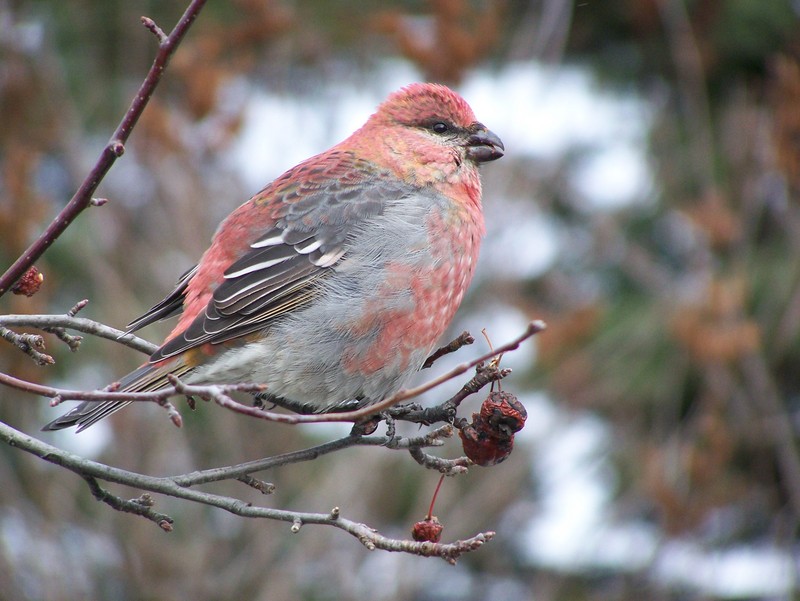|
| 질의: black back | 결과: 253번째/1144 | |
Pine Grosbeak (Pinicola enucleator) - Wiki
| 제목: | Pine Grosbeak (Pinicola enucleator) - Wiki
| |

| 해상도: 2832x2128
파일크기: 1377773 Bytes
촬영일: 2007:11:07 10:48:40
사진기: KODAK Z650 ZOOM DIGITAL CAMERA (EASTMAN KODAK COMPANY)
F number: f/3.7
Exposure: 1/200 sec
Focal Length: 630/10
등록시간: 2007:12:27 14:03:56
|
Pine Grosbeak
From Wikipedia, the free encyclopedia
Order: Passeriformes
Family: Fringillidae
Subfamily: Carduelinae
[Photo] Male Pine Grosbeak (Pinicola enucleator). Date: 7 November 2007. Released into the public domain (by the author). URL: http://en.wikipedia.org/wiki/Image:Pine_grosbeak17.jpg
The Pine Grosbeak, Pinicola enucleator, is a large finch. It is the only member of its genus and represents an ancient divergence of the ancestors of the bullfinches (Arnaiz-Villena et al., 2001), diverging perhaps a dozen mya during the Clarendonian. Given that the radiation of the bullfinches (which are only found in Eurasia) and the mountain finches (also closely related: Marten & Johnson, 1986) started approximately at the same time in the interior of Asia, it is possible that the Pine Grosbeak evolved in North America; possibly, its ancestors were wind-blown individuals of a proto-bullfinch which arrived via the northern Pacific as at that time the Bering Land Bridge was widely inundated.
Adults have a long forked black tail, black wings with white wing bars and a large bill. Adult males have a rose red head, back and rump. Adult females are olive-yellow on the head and rump and grey on the back and underparts.
Their breeding habitat is coniferous woods across Canada, Alaska and the western mountains of the United States, and in northern Fennoscandia. They nest on a horizontal branch or in a fork of a conifer.
This bird is a permanent resident through most of its range; in the extreme north or when food sources are scarce, they may migrate further south.
This species is a very rare vagrant to western Europe.
These birds forage in trees and bushes. They mainly eat seeds, buds, berries and insects. Outside of the nesting season, they often feed in flocks.
The Pine Grosbeak was depicted on the 1986 series Canadian $1000 bill.
http://en.wikipedia.org/wiki/Pine_Grosbeak
| The text in this page is based on the copyrighted Wikipedia article shown in above URL. It is used under the GNU Free Documentation License. You may redistribute it, verbatim or modified, providing that you comply with the terms of the GFDL. |
|
댓글 |
|---|
| | 손님 |
|
| The pine grosbeak (Pinicola enucleator) is a large member of the true finch family, Fringillidae. It is found in coniferous woods across Alaska, the western mountains of the United States, Canada, and in subarctic Fennoscandia and Siberia. |
^o^
동물그림창고 똑똑전화 누리집
^o^
|
|
|

